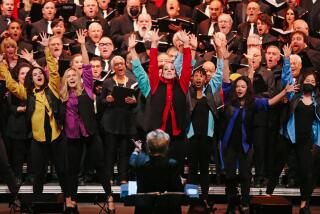Coughlin Wanted Chorus to Endure for 500 Years
- Share via
When Father Richard T. Coughlin started the All-American Boys Chorus in 1970, he had visions of an organization that would last for centuries.
Coughlin was teaching at St. Anthony Claret parish school in Anaheim when he first assembled the group and started rehearsals. The early result was “chaos,” he said later, but several youngsters from that group became the core of what was to become the All-American Boys Chorus.
“I was hoping I could start something that would endure,” Coughlin told The Times in 1990. “I set a goal of 500 years, like the Vienna Boys Choir. That’s what I had in mind. I hoped it would be something permanent.”
Under Coughlin’s direction, the chorus gained an international reputation, performing in Moscow, Leningrad (now St. Petersburg) and Kiev during a tour of the then-Soviet Union, in addition to concert tours of Austria, Italy, Germany and Switzerland. The chorus has performed as many as 100 concerts in a single year, and has toured regularly in the Pacific Northwest and western Canada.
Locally, the chorus has sung in the 3,000-seat Orange County Performing Arts Center and other venues. The group has sung on television commercials and recorded several albums, including “A Little Christmas Magic” and “On the Sunny Side of the Street.” The chorus has also sung with such celebrities as Bob Hope, Tony Bennett, Steve Allen and Victor Borge.
In recent years the chorus program has numbered more than 100 boys, most between the ages of 9 and 14. About 75 of those actually sing and perform in concerts, with others in various stages of training.
Members of the Costa Mesa-based chorus are recruited from throughout Orange County, with the only requisite being an interest in music. Lessons and training are free so long as the boys advance through the various training levels.
The self-sustaining chorus raises money (its 1990 budget was $500,000) primarily through concert and recording fees, with the rest coming through fund-raisers, contributions by booster clubs and private donations. Coughlin took no salary.
Coughlin had dreamed of someday funding a campus for the chorus. “I’ve always envisioned that someday we’d have a building of our own,” he said in 1990. “I’ve always felt we should be a day school, with reading, writing, arithmetic and chorus.”


